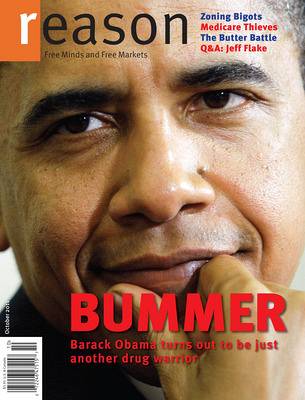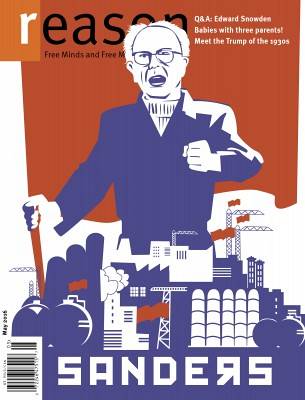 Even before Elizabeth Warren’s announcement today that she’s forming an exploratory committee about a possible presidential run, the 2020 Democratic shadow primary has been in full knife-sharpening mode. Supporters of the septuagenarian socialist Bernie Sanders have been attacking the progressive bona fides of vanquished Ted Cruz challenger and fundraising hearththrob Beto O’Rourke.
Even before Elizabeth Warren’s announcement today that she’s forming an exploratory committee about a possible presidential run, the 2020 Democratic shadow primary has been in full knife-sharpening mode. Supporters of the septuagenarian socialist Bernie Sanders have been attacking the progressive bona fides of vanquished Ted Cruz challenger and fundraising hearththrob Beto O’Rourke.
“What does Beto O’Rourke actually stand for?” wonders Zaid Jilani in Current Affairs. (Partial answer: The former congressman and city councilman from El Paso has “rarely, if ever, challenged the powerful.”) “We don’t need another photogenic media star with run-of-the-mill liberal politics running for president,” declares Jacobin‘s Branko Marcetic. “What we’re seeing is someone who’s a big step up for red-state Texas statewide and actually a big step down for where the majority of Democrats are nationwide,” progressive media grumpus Norman Solomon tells NBC. Washington Post columnist Elizabeth Bruenig summs up the O’Rourke-reticence:
I think the times both call for and allow for a left-populist candidate with uncompromising progressive principles. I don’t see that in O’Rourke.
We still have time to pick a politician with a bold, clear, distinctly progressive agenda, and an articulated vision beyond something-better-than-this, the literal translation of hope-change campaigning….
As for me, my cards are always on the table: I wish the Democrats would run a left-populist with sincere, well-attested antipathy toward Wall Street, oil and gas, welfare reform and war, who is willing to fight hard to win Medicare-for-all and drastically reverse our current course on climate change. I would love it if they came from Texas, but I would take one from anywhere.
This fight among the Very Online Left has some real-world implications for the majority of us residing outside the Democratic Party. Because if progressive is going to mean virtuous within one of the two major political factions in this country, it’s instructive to see which positions are prioritized under that description, and which are not. For instance, there are three non-trivial issues that go unmentioned in Bruenig’s piece: immigration, criminal justice reform, and the drug war.
 These are not incidental to O’Rourke’s political career. They’re central. While Ted Cruz was abandoning his criminal justice priors and taking populist potshots at his toothy challenger, O’Rourke was campaigning against mandatory minimum sentences, cash bail, and the “failed war on drugs.”
These are not incidental to O’Rourke’s political career. They’re central. While Ted Cruz was abandoning his criminal justice priors and taking populist potshots at his toothy challenger, O’Rourke was campaigning against mandatory minimum sentences, cash bail, and the “failed war on drugs.”
The latter position in particular separates the Texan from 99 percent of elected Democrats. At O’Rourke’s urging, the El Paso City Council in 2009 passed a resolution calling for debate and study of legalizing drugs. (Recall that at that time, Barack Obama, to whom O’Rourke is frequently compared these days, was making unfunny jokes about legal weed and initiating a vicious crackdown against state-legal medical dispensaries.) Two years later the city councilman co-wrote a book advocating marijuana legalization, then in 2012 he successfully primaried eight-term Democratic drug-warrior congressman and former Border Patrol officer Silvestre Reyes.
Bernie Sanders went full legalization in 2015—a big deal, given that he was the first truly competitive presidential candidate to do so. But considering the enormous damage that the drug war has inflicted on millions of Americans, particularly among the poor and minority communities that Democrats claim to champion, O’Rourke’s timelier leadership on the issue seems worthy of more than just a passing reference. Jilani’s piece, for example, puts a button on the drug-war conversation after a quick paragraph by saying that the victory over Reyes “may have been the last time O’Rourke waged a sustained campaign against the Democratic establishment,” even though the congressman continued swimming upstream against his own party’s drug policies upon arrival to Washington.
Immigration, on which O’Rourke has been (as Nick Gillespie pointed out yesterday) a welcome source of realism, also goes unmentioned in Jilani’s brief. Pro-Sanders writer David Sirota, who has been leading the anti-Beto charge from the left, does spend a paragraph listing O’Rourke’s immigration-related advocacy…then squeezes eight withering paragraphs out of a single vote for waiving polygraph tests on Customs and Border Patrol agents.
 You can see why Team Bernie’s attacks on Beto’s immigration policies would be either hopelessly strained or non-existent, given the 2020 Democratic political climate of opposing restrictionist Donald Trump. Sanders, after all, dismissed the idea of significantly raising legal immigration levels as “a Koch brothers proposal” in 2015, and he helped kill comprehensive immigration reform in 2007 on grounds that it would reduce wages for native workers. Coupled with his career-long opposition to international trade treaties (because, he says falsely, they amount to a global “race to the bottom“), Bernie’s Old Labor immigration skepticism has sounded rather Trumpy at times, even if the process of campaigning for president changed his emphases (as well as Hillary Clinton’s) on the issue.
You can see why Team Bernie’s attacks on Beto’s immigration policies would be either hopelessly strained or non-existent, given the 2020 Democratic political climate of opposing restrictionist Donald Trump. Sanders, after all, dismissed the idea of significantly raising legal immigration levels as “a Koch brothers proposal” in 2015, and he helped kill comprehensive immigration reform in 2007 on grounds that it would reduce wages for native workers. Coupled with his career-long opposition to international trade treaties (because, he says falsely, they amount to a global “race to the bottom“), Bernie’s Old Labor immigration skepticism has sounded rather Trumpy at times, even if the process of campaigning for president changed his emphases (as well as Hillary Clinton’s) on the issue.
O’Rourke, on the other hand, has been consistently pro-immigration and pro-trade throughout his career. “It’s in our interests to be facilitating trade and the flow of people, and to recognize the value of immigrant labor, whether it’s low-skilled, low-wage or the very high skilled, high-wage labor,” he told Reason‘s Mike Riggs in 2013.
O’Rourke’s pro-trade posture is a main part of the progressive brief against him, along with insufficient enthusiasm for single-payer health insurance, free college, and the Green New Deal. He is not as pro-regulation as his critics would like, and not nearly hostile enough to the oil and gas industries. And fair enough—all these positions are indeed deviations from modern progressivism, even if they sound more comparatively pleasing to a non-leftist’s ears. But what about, you know, war?
After all, O’Rourke was a member of the House Armed Services Committee, is a withering critic of both the Iraq and Libya interventions (“two incredibly ill-conceived regime change wars ”), opposed bombing Syria, and has consistently called on Congress to end the open-ended post-9/11 Authorization for Use of Military Force (“blank check for endless war“) and reassert its war-declaration powers. “Troubling, unconstitutional, to be at war in Iraq, Syria, Libya, Yemen & Somalia, in addition to Afghanistan, w/out informed authorization,” he tweeted in 2017. “Why do we have such a hard time admitting the West’s role and culpability in the problems in the Middle East?” he wrote in 2016.
O’Rourke has many policies I disagree with, including some unearthed by his critics this month—voting for the awful FOSTA/SESTA law, for example. But by prioritizing economic policy complaints far above the life-and-death questions of war, human mobility, and the police state, progressives are adding to the suspicion that the beating heart of Bernieism is nowhere near the civil libertarian issues where libertarians and lefties overlap.
from Hit & Run http://bit.ly/2EZBlsb
via IFTTT